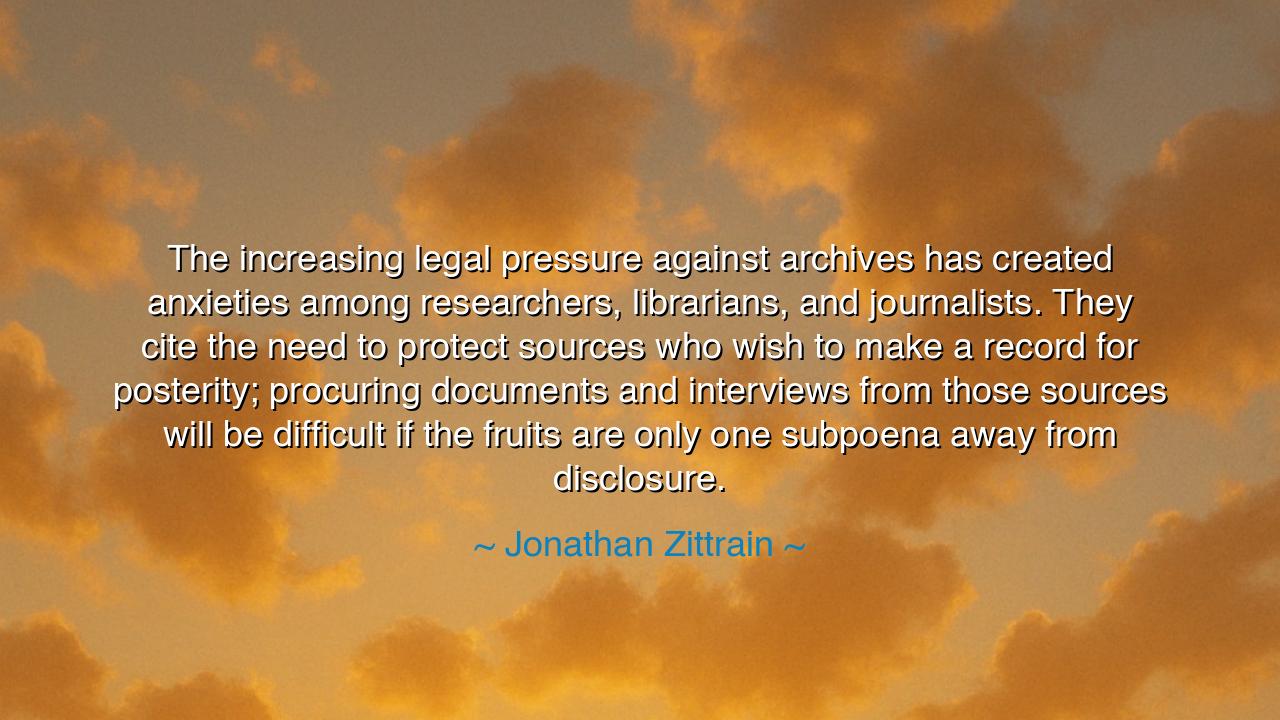
The increasing legal pressure against archives has created
The increasing legal pressure against archives has created anxieties among researchers, librarians, and journalists. They cite the need to protect sources who wish to make a record for posterity; procuring documents and interviews from those sources will be difficult if the fruits are only one subpoena away from disclosure.






Hear the sober words of Jonathan Zittrain: “The increasing legal pressure against archives has created anxieties among researchers, librarians, and journalists. They cite the need to protect sources who wish to make a record for posterity; procuring documents and interviews from those sources will be difficult if the fruits are only one subpoena away from disclosure.” These words are heavy with warning, for they speak of a struggle not only for documents and records, but for memory itself—the battle to preserve truth against the consuming fire of fear and legal coercion.
The meaning of this quote is rooted in the fragile trust that binds sources to those who record history. When a witness, a whistleblower, or a victim comes forth to speak, they entrust their words to archivists, scholars, and journalists, believing that their testimony will be guarded and honored. But if those words can be seized at any moment by courts or powers through a subpoena, then trust dissolves. The result is silence. And silence, in the life of a people, is death to truth.
The origin of Zittrain’s thought lies in the long and difficult history of archives. From the scrolls of Alexandria to the hidden manuscripts of monks in the Dark Ages, archives have always been the storehouses of memory. But again and again, rulers and powers have sought to pry them open, to seize the records, to use them against the very people who trusted in their secrecy. The words of Zittrain echo this timeless tension: archives must remain sanctuaries, lest they become weapons turned against their keepers and contributors.
History gives us vivid warnings. Consider the fate of the East German Stasi files. Kept in secret by the state to monitor its citizens, those archives became instruments of fear. Informants betrayed neighbors, records crushed trust, and a society was poisoned by suspicion. After the wall fell, people demanded access to these files, but many found their lives torn apart by the revelations. Zittrain’s words remind us of the opposite side of this danger: if archives that are meant to preserve truth are made vulnerable to state demands, they too may cease to be sanctuaries of memory and become tools of control.
Think also of the journalists of Watergate. If their sources had not trusted that their names and testimonies would remain protected, the scandal may never have been uncovered, and corruption would have triumphed. It was the sanctity of confidential archives—notes, tapes, private records—that allowed history to be revealed. But if every record is “one subpoena away from disclosure,” as Zittrain warns, then the next whistleblower will not speak, the next corruption will remain hidden, and the torch of accountability will flicker out.
The deeper wisdom of the quote is that posterity itself is at risk. Archives are not only for the present generation; they are the inheritance of the future. If they are tainted by fear, if voices fall silent because the promise of protection has been broken, then the future will inherit a void. They will ask: what really happened in our age? And the archives will reply with silence, because the people were too afraid to speak. A civilization without record is a civilization that forgets, and forgetting is the death of wisdom.
The lesson for us is urgent: protect the sanctity of archives. Stand beside researchers, librarians, and journalists who defend confidentiality. Demand laws that shield sources, for truth cannot thrive without protection. Encourage those who speak for posterity, assuring them that their words will not be turned into weapons against them. Each of us must understand that archives are not dusty collections, but living fortresses of memory, without which justice itself will falter.
Thus let Zittrain’s words be remembered: if archives become vulnerable, trust dies; if trust dies, truth is buried; if truth is buried, justice vanishes. Let every generation guard the sanctuaries of memory, so that history is not silenced, but preserved, and the voices of the past may speak boldly to the future. For in the keeping of archives lies not only knowledge, but the soul of a people.






AAdministratorAdministrator
Welcome, honored guests. Please leave a comment, we will respond soon